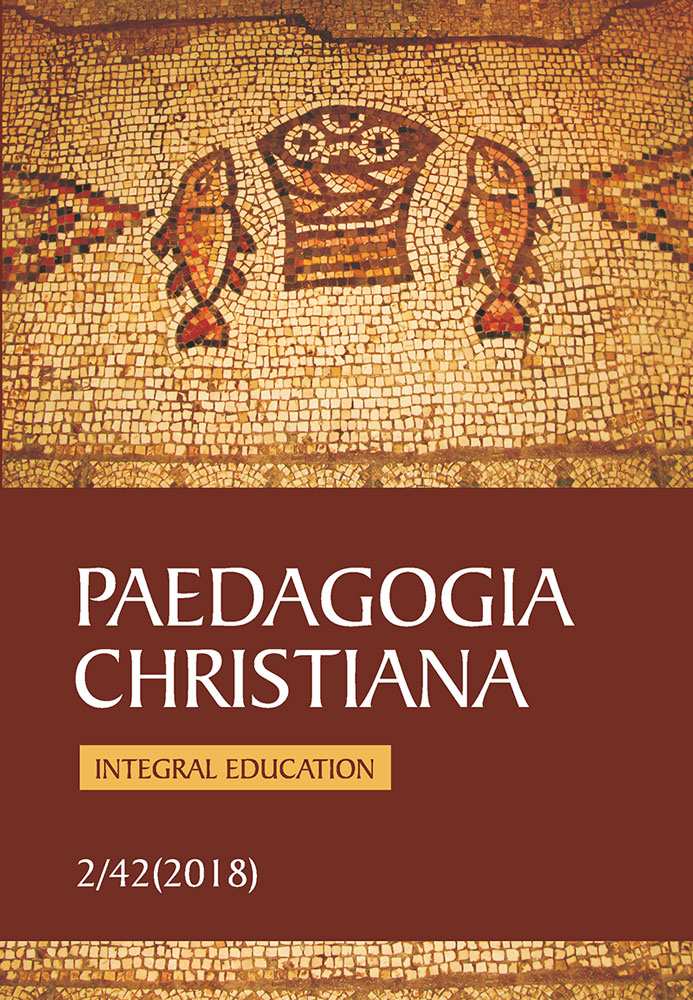Education for Health as Bodily and Spiritual Well-Being
DOI:
https://doi.org/10.12775/PCh.2018.020Keywords
health, human body, well-being, health education, axiological educationAbstract
The search for a conception of health education that could be contained within the framework of the pedagogical category of integral education is associated with the contemporary philosophy of health and the basic beliefs of which allowing for the identification of health with biopsychosocial well-being. In the context of the contemporary cultural valuation of the body education faces a number of difficulties and is falling short in many areas. One of the directions proposed within health education is to base its teleological foundations on the integral vision of man, in which he constitutes the ontic whole of the bios and psyche, the organic body and the spiritual life, organized by the principle of the personal “I”. The implementation of such goals requires the reference to values, hence in the integral approach to health education, the key task is to shape axiological awareness in relation to the value of the human body.
References
Antonovsky, Aaron. Unravelling the Mistery of Health. How People Manage Stress and Stay Well. San Francisco: Jossey-Bass Publishers, 1987.
Bertalanffy, Ludvig. General System Theory: Foundations, Development, Applications. New York: George Braziler, 2015.
Błajet, Piotr. Ciało jako kategoria pedagogiczna. W poszukiwaniu integralnego modelu edukacji [Body as a pedagogical category. In search of the integral model of education]. Toruń: Wydawnictwo Uniwersytetu Mikołaja Kopernika, 2006.
Daniluk, Marek. „Duchowość chrześcijańska” [Christian spirituality]. W: Encyklopedia Katolicka, t. IV, 317-318. Lublin, TN KUL, 1983.
Dąbrowski, Kazimierz. „Co to jest zdrowie psychiczne” [What is mental health?]. W: Zdrowie psychiczne, red. Kazimierz Dąbrowski, 7-35. Warszawa: Państwowe Wydawnictwo Naukowe, 1981.
Frankl, Victor Emil. Homo patiens. Warszawa: Instytut Wydawniczy PAX, 1984.
Heszen, Irena, Helena Sęk. Psychologia zdrowia [Psychology of health]. Warszawa: Wydawnictwo Naukowe PWN, 2007.
Heszen-Niejodek, Irena. „Wymiar duchowy człowieka a zdrowie” [Man’s spiritual dimension and health]. W: Zasoby osobiste i społeczne sprzyjające zdrowiu jednostki, red. Zygfryd Juczyński, Nina Ogińska-Bulik, 33-47. Łódź: Wydawnictwo Uniwersytetu Łódzkiego, 2003.
John Paul II. Man and Woman He Created Them. A Theology of the Body. Slough: Pauline Books and Media, 2011.
Kowalczyk, Stanisław. Ciało człowieka w refleksji filozoficznej [Human body in philosophical reflection]. Lublin: Katolicki Uniwersytet Lubelski, 2009.
Krąpiec, Mieczysław Albert. „Człowiek bytem osobowym” [Man as personal being]. W: Wychowanie na rozdrożu. Personalistyczna filozofia wychowania, red. Franciszek Adamski, 81-92. Kraków: Wydawnictwo Uniwersytetu Jagiellońskiego, 1999.
Lalonde, Marco. A New Perspective on the Health of Canadians. Ottawa: Government of Canada, 1974.
Olbrycht, Katarzyna. „Odpowiedzialność pedagoga” [The Pedagogue’s Responsibility]. W: Edukacja aksjologiczna, t. 2, red. Katarzyna Olbrycht, 11-18. Katowice: Wydawnictwo Uniwersytetu Śląskiego, 1995.
Olbrycht, Katarzyna. Prawda, dobro i piękno w wychowaniu człowieka jako osoby [Truth, goodness and beauty in the education of man as a person]. Katowice: Wydawnictwo Uniwersytetu Śląskiego, 2000.
Ostrowska, Krystyna. „Zdrowie młodzieży w aspekcie psychicznym” [Teenagers’ health in its mental aspect]. W: Zdrowie dzieci i młodzieży w aspekcie fizycznym, psychicznym, społecznym i duchowym, red. Andrzej Jopkiewicz, Jan Schejbal, 131-142. Kielce: Kieleckie Towarzystwo Naukowe, 1998.
Pawłucki, Andrzej. Nauki o kulturze fizycznej [On physical culture]. Kraków: Oficyna Wydawnicza „Impuls”, 2015.
Turner, Bryan S. Regulating Bodies. Essays in Medical Sociology. London: Routledge, 1992.
World Health Organization. “Preamble to the Constitution of the World Health Organisation”. Official Records of the World Health Organisation 2 (1946): 100.
World Health Organization. Targets for health for all 2000. Copenhagen: World Health Organization Regional Office for Europe, 1985.
Wilber, Ken. Integral Psychology: Conscioussness, Spirit, Psychology, Therapy. Boston: Shambala Publications Inc, 2000.
Downloads
Published
How to Cite
Issue
Section
Stats
Number of views and downloads: 722
Number of citations: 0



